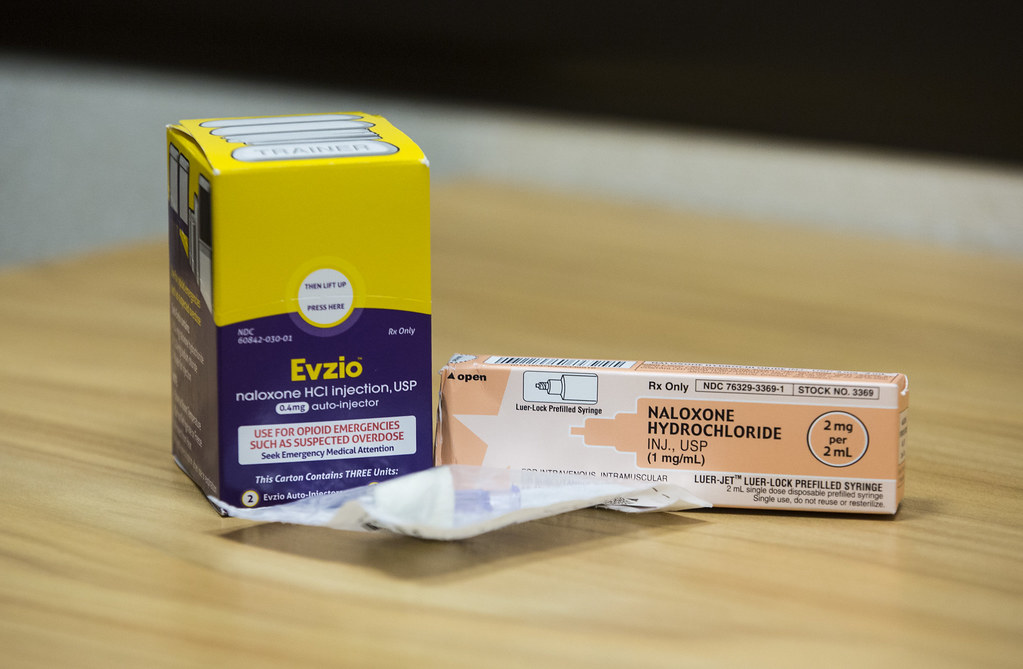The Addiction and Public Policy Initiative at the O’Neill Institute for National and Global Health Law and the HoyaDOPE Project at the Georgetown University School of Medicine, a student group dedicated to reducing opioid overdose deaths, hosted a naloxone training and distribution event in recognition of International Overdose Awareness Day on Aug. 31.
The naloxone training and distribution event trained students and staff on how to administer naloxone in emergency situations. Naloxone is a drug that is used to rapidly reverse opioid overdoses for 30 to 90 minutes while the patient waits for further medical assistance. The National Institutes of Health reported that naloxone has reduced overdose deaths by 14% after states enacted naloxone access laws.
Regina LaBelle, the director of the Addiction and Public Policy Initiative at the O’Neill Institute, said International Overdose Awareness Day allows everyone to learn more about how they can help combat the United States’ opioid epidemic.
“The purpose of International Overdose Awareness Day is to bring awareness to the issue of overdoses in the United States and to recognize the role that each one of us plays in reducing overdoses,” LaBelle told The Hoya.
There were an estimated 109,680 deaths in 2022 from overdose-related opioid use across the United States, according to the Center for Disease Control and Prevention. In Washington, D.C., an estimated 461 people died from opioid-related overdoses in 2022. International Overdose Awareness Day is dedicated to building awareness about the dangers of opioid use and taking precautions to prevent these deaths from occurring.
According to LaBelle, in addition to the naloxone training, the Addiction and Public Policy Initiative is consistently taking action to combat opioid-related overdoses in the D.C. area.
“We do convenings, we issue reports, we talk to members of Congress and we use the research that we do to advance evidence-based practices to increase health outcomes for people who are affected by addiction,” LaBelle said.

The naloxone training event, hosted at the Georgetown University Law Center, sparked an important conversation about the intersection of law and medicine, according to LaBelle. She emphasized the importance of this intersection and how it is embraced at the O’Neill Institute.
“The O’Neill Institute operates at the intersection of public health and law, and the law can be a really important tool to advancing evidence-based policies,” LaBelle said. “There are lots of legal tools that can be used to advance evidence-based policies.”
Thaddeus Wientzen (GRD ’27) works in the emergency room at MedStar Georgetown University Hospital and attended the event. Although Wientzen had previous training with naloxone, he said he appreciated the event because it served as a reminder of the drug’s capabilities.
“It’s good to have a refresher and to know what you’re dealing with and how to have an emergency response to any situation,” Wientzen told The Hoya.
Wientzen said the event is also important for people who may not be actively involved in the medical field.
“The more we have the conversation, the more we normalize this language,” Wientzen said. “The more people will understand it, and they will hopefully embrace the tactics that we have on hand to save people’s lives and keep them alive long enough until they can get the help that they need.”
Another student who attended the event, Matthew Braun (GRD ’26), said training people in naloxone is necessary because an emergency can happen at any moment.
“You could just be walking down the street, and unfortunately, someone could experience an overdose, so I think it’s something that’s really important to know,” Braun told The Hoya.
Braun was also particularly grateful for the number of students present at the event and the sense of community that it fostered.
“I was really glad to see how many people were there,” Braun said. “The idea that we could all come together and talk about really what an overdose was and how to help somebody who was experiencing one without feeling any sort of stigma was really great.”
While recognizing International Overdose Awareness Day and hosting the naloxone training event was an important step in battling the opioid crisis in the District, Wientzen said Georgetown can still do more to address this issue.
“I hope that we have more of these types of events,” Wientzen said. “I hope that Georgetown as a whole embraces this kind of culture shift and that we all, as a community, begin to approach addiction in a more progressive and less reactive manner.”








